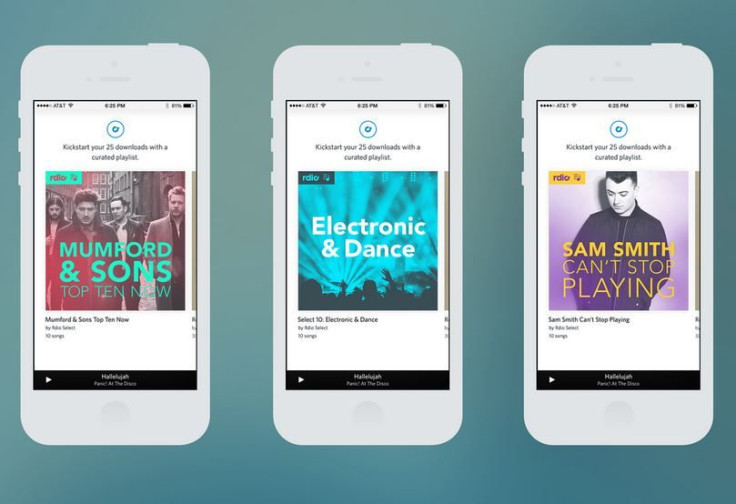Rdio Marries Radio And On-Demand Music With Cheaper Tier

For most of the 21st century, on-demand streaming music services have been hailed as the future -- a paradigmatic revolution in the history of music consumption. On Thursday, the online music service Rdio launched a mobile on-demand service that’s designed to further improve upon what people are used to.
The service, Rdio Select, offers users a mix of ad-free streaming radio stations and the ability to save or cache up to 25 songs at a time for on-demand listening on their phones; users can change the songs they've cached every day. The service costs $3.99 per month, rather than the $9.99 that has become the unofficial standard for paid, on-demand streaming, and it caters to a number of long-standing consumer behaviors.
“In most subscription businesses, they have price tiers,” Rdio CEO Anthony Bay told International Business Times. “In our business, we only had one.
“If you look at people's buying behavior on tracks, they'll hear something they like on the radio, and they'll buy it,” Bay continued. “We're replicating that experience.”
Same Old Song
For all the change that’s reverberated through the music industry this century, a lot of consumer habits remain unchanged. Radio is the primary place for music discovery among American consumers, according to Nielsen, and despite ongoing declines, huge numbers of people continue to purchase music. Digital sales revenues for recordings totaled $1.9 billion in North America in 2014, according to the International Federation of Phonographic Industries.
Rdio is hoping that by removing the friction between discovery and acquisition it can warm people up to the idea of using a streaming on-demand service. “The biggest hurdle, overall, is education,” Bay said. “I don’t know anybody who was a subscriber and went back to buying [tracks individually].”
Bay is also hoping Rdio Select, which is launching in Canada, Australia, New Zealand, India and South Africa in addition to the United States, will be able to build on the success of another digital music service: Pandora.
“The most successful legal music service in the world is Pandora in terms of active users and listening,” Bay said. But because of some key differences between the U.S. copyright system and those found in foreign markets, Pandora has been slow to expand abroad. “No one has really exported that experience on a global basis,” he said.
The Price Is Right?
Rdio Select’s price point reflects established consumer habits as well. Years of consumer research have shown that the average American consumer spends between $50 and $60 per year on music -- the average iTunes consumer spends about $12 every four months – which makes the $9.99 monthly price for services like Rdio, Spotify and Tidal seem like wishful thinking on the part of record labels and the providers.
Bay said Rdio Select’s price better reflects that research, but the company didn’t choose the price alone. The company worked with the record label it relies on for its catalog to reach consensus on Rdio Select's price tag, along with every other aspect of the service, right down to the number of songs a user could cache on his or her device at a time. “We can't do anything unilaterally,” Bay said. “That's not the way the business works.”
Sending The Right Message
Rdio Select is also a kind of rebuke to the idea of a "freemium" tier for streaming on-demand music, a hot topic of conversation lately in the music industry. “The idea of free on-demand is fundamentally flawed,” Bay said. “It was an experiment when piracy was rampant.”
Today, seven years after Spotify launched in beta form in Europe, consumers can choose from an abundance of streaming options, and Bay is part of a growing chorus of industry voices saying a free offering sends the wrong message to consumers.
“The logic is flawed,” Bay said. “If Apple came out tomorrow and said, ‘You can listen to everything on iTunes for free, but every fourth song, you need to listen to an ad,' why would anybody ever buy music again?”
Change In Tune
Ever since Rdio was launched by Skype co-founders Janus Friis and Niklas Zennström in 2010, it has never shared its subscriber totals publicly. Even though Rdio is available in 85 countries around the world, it is difficult to assess where it stands in relation to Spotify, which has more than 60 million monthly users, or Google, which has also never disclosed how many people are paying for its on-demand product, Google Play Music All Access, or even Tidal, which Jay Z says has more than 700,000 subscribers.
But for now, on mobile, Rdio Select stands alone. “There need to be price points between zero and 10,” Bay said.
© Copyright IBTimes 2024. All rights reserved.





















